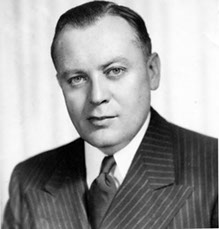
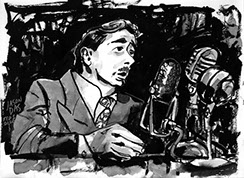
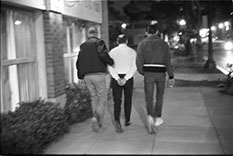
Photograph of a vice squad sting operation targeting homosexuals in the 1950s. Photo courtesy of Google Images.
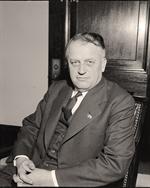
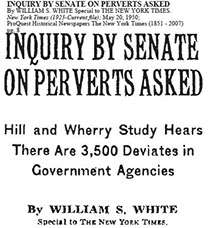
Kenneth Wherry headed the preliminary investigation into the “homosexual problem.” Photo courtesy of Google Images.
One of many sensational headlines that ran across the country after Blick’s testimony, outraging millions of Americans. Photo courtesy of Google Images.
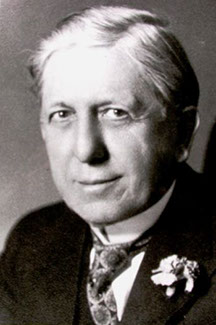
Clyde Hoey. The investigation the senator headed became known as the Hoey Report, much to his chagrin. Photo courtesy of Google Images.
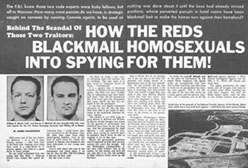
Newspaper clipping with untrue story about a pair of gay lovers who defected to the Soviet Union with state secrets. Photo courtesy of Google Images.
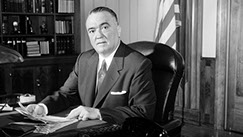
J. Edgar Hoover was ruthless in his attempts to stamp out homosexuals and the gay press, and is rumored to have been homosexual himself. Photo courtesy of Google Images.
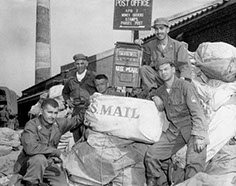
Photograph of servicemen in Korea in 1950 with mailbags. The FBI used the post to aggressively censor materials considered obscene. Photo courtesy of Google Images.

ONE Magazine’s from 1953 and 1954 Seized by the postmaster general of Los Angeles for obscenity. Photo courtesy of Google Images.
The ONE Exhibition,
The Roots of the LGBT Equality Movement
ONE Magazine &
The First Gay Supreme Court Case In U.S. History
1943-1958
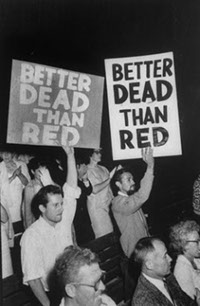
Photo of a public rally, early 1950s. Photo courtesy of Google Images.
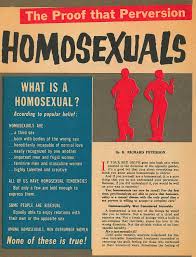
Pamphlet cover from the early 1950s illustrating American’s confusion over homosexuals. Photo courtesy of Google Images.
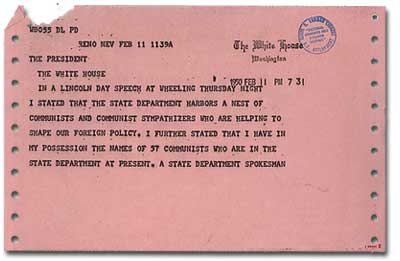
Telegram from McCarthy to President Truman, February 11, 1950. Photo Courtesy of Google Images.
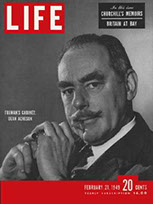
Dean Acheson on the cover of Life Magazine. Acheson tried unsuccessfully to deflect the accusations of McCarthy from the State Department. Photo courtesy of Google Images.
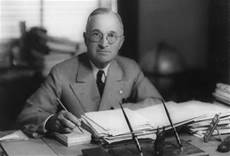
Harry Truman promoted American assistance in the rebuilding of Europe after WWII. Photo courtesy of Google Images.
Styles Bridges. Photo courtesy of Google Images.
Dramatization of a man testifying before a Senate Subcommittee. Photo courtesy of Google Images.
.
The euphoria of winning the war quickly faded in the years after WWII ended. Americans watched the specter of communism growing in Russia, China, and Southeast Asia, and as tensions mounted, the U.S. government waged an escalating war of espionage on communism.
Fears spread of spies and other agents in the employ of the communist powers, bent on weakening the U.S. from within by infiltrating government agencies, subverting American children, and stealing state secrets.
Suddenly, anyone could be your enemy: your neighbors, coworkers, or even your spouse, friends, or family members.
The threat was perceived to be part of a vast and shadowy conspiracy emanating from the Soviet Union, one that was infiltrating the highest levels of the U.S. government, and directed at traditional American family values.
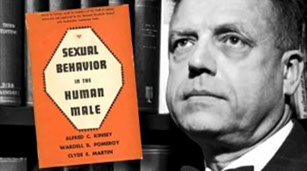
Photo of Alfred Kinsey with his seminal book on male sexuality. Kinsey’s work dramatically changed the way American’s thought of sex and sexuality. Photo courtesy of Google Images.
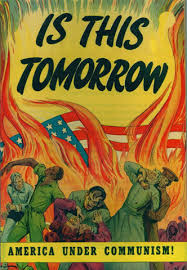
Government sponsored propaganda posters warning against the dangers of communists were ubiquitous in the 1950s, stoking the public’s fears. Images courtesy of Google Images.
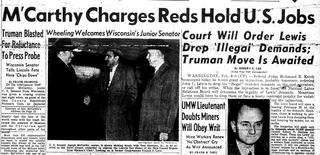
Sensational newspaper clipping. Photo courtesy of Google Images.
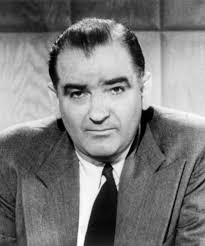
Senator Joseph McCarthy. Congress eventually censured McCarthy for his unsubstantiated accusations. Photo courtesy of Google Images.
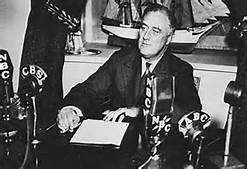
F.D. Roosevelt jumpstarted the nation’s economy through an ambitious program of building and expansion. Photo courtesy of Google Images.
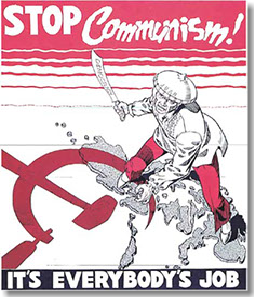
When secretary of state Dean Acheson next appeared on Capitol Hill, soon after McCarthy’s accusations, Congress was intent upon discussing the “homosexual problem” in the State Department, and the media was there to record his testimony.
A group of conservative, primarily Republican, senators were intent upon pressing the issue, as part of a plan to discredit then-current Democratic policies. Their attacks largely relied on emphasizing perceptions of weakness and corruption. These perceptions were easily translated to their constituents through sensationalist media, and the homosexual scandal proved to be incredibly powerful.
These conservative frustrations were focused on many progressive liberal policies at the time, and had been steadily building during the Democratic Party’s nearly twenty-year tenure, beginning with F.D. Roosevelt’s New Deal in the early 1930s during the Great Depression, and continuing through Truman’s Post-WWII Marshall Plan and his Internationalist policies in the late 1940s.
Senator Styles Bridges (R-New Hampshire), one of the most powerful Republican senators at the time, questioned Secretary Acheson at length. During the proceedings, Acheson and undersecretary of state John Peurifoy revealed that 91 homosexuals had been removed from the State Department in the previous 2 years.
This revelation gave House Republicans the fuel they needed to attack the liberal policies of the Democratic administration, and a series of investigations were launched.
When he asked Acheson what he considered a security risk, Acheson replied: “Under the State Department’s security program, persons who engaged in espionage, divulged classified information, or joined Communist or Nazi organizations were all considered security risks.”
After prodding from Bridges, Acheson added that poor character traits that might lead to Communist or Nazi sympathies would also disqualify individuals from employment, including homosexuality, although to date, only one State Department employee had been fired for homosexuality.
Acheson claimed that only one employee was found to be homosexual during recent investigations of potential and existing employees, Bridges persisted, asking how many individuals who had been under investigation had resigned. Peurifoy then stated that ninety-one had resigned, and after further badgering, he admitted that they were in a “shady category.”
Peurifoy explained that the shady category included “people of moral weakness and so forth.” He was attempting to avoid stating explicitly that homosexuals were part of the investigation, as the mere mention of the word homosexual gave credence to McCarthy’s claims of sex perverts in their employ.
The senators demanded clarification, to which Peurifoy finally conceded, admitting that indeed, “most of these were homosexuals,” thus providing the Republican’s with the fuel they needed for their attack on the State Department, the Democrats in Congress, and the president, Harry Truman.
As part of the preliminary investigation, Lt. Roy E. Blick, head of the Washington Vice Squad, was summoned to testify in a closed hearing as a local expert. Blick claimed to have used his department's arrest records to compile a list of homosexuals. He offered to create a nationwide card catalogue of homosexuals for all government agencies and contract employers to use in their investigations. Blick was one of many officials who created elaborate lists of men and women suspected of subversive activities, such as homosexuality or involvement in the Communist Party.
For years, Blick ran a ruthless anti-vice operation dedicated to ridding the city’s parks, streets, and public restrooms of vices including prostitution and homosexual activity, and Blick and his officers were well known for arresting hundreds of men, often on the flimsiest of charges.
Blick stated under oath that, conservatively, there were 5,000 sex perverts in Washington. He also told the committee that in his opinion, 3,500 worked in government, including 300-400 who worked for the State Department.
Much like McCarthy's accusations, Blick's estimates had no factual foundation. And like McCarthy's, they were carried by the press, and were soon considered to be fact, illustrating much of the public’s unwillingness, or inability, to look at media reports with a critical eye. The testimony was used and manipulated by Republicans to further their agenda of discrediting the administration and fueled anti gay sentiment nationwide.
Upon completion of the preliminary investigation, Senator Kenneth Wherry, a Republican from Nebraska, announced that an “emergency situation” existed in Washington regarding homosexuals.
He went so far as to claim that the Russians had acquired a global list of homosexuals that had been compiled by Hitler as an espionage tool and they were using it to blackmail government employees for state secrets.
Wherry also claimed that the Soviets were targeting heterosexual female government employees, controlling them by enticing them into a life of lesbianism.
Senator Wherry’s report unleashed a flurry of newspaper columns, constituent mail, public debate, and congressional investigations throughout 1950 about the presence of homosexuals in government and their connections to Communists.
Although there was no evidence of its ever actually happening in America, homosexuals were accused of being the frequent target of spies who employed blackmail to coerce state secrets from them with threats of their sexuality being exposed to their friends, family, and employers.
Thus, a web was spun, begun by McCarthy, but embellished and manipulated by the Republican establishment, linking homosexuals and communists, and soon the two were virtually synonymous in public opinion.
Republicans used the "opportunity" of the revelations of rampant homosexual infiltration of the government to attack the Democratic administration of Harry Truman from all sides, demanding a full, nonpartisan investigation into the problem of homosexual activity in the capitol.
This was no accident, as Republican’s, in preparation for the 1952 presidential elections, sought to embarrass Acheson’s State Department and the entire Truman administration.
Indeed, Republicans were determined to take back the White House, and used McCarthyism as a convenient and powerful tool. Some scholars believe that McCarthy’s anti-communist witch-hunt was designed to regain the White House for the Republican Party.
Senator Clyde Hoey was a Democrat from North Carolina. His Subcommittee on House Appropriations took on the task of the official investigation. In December 1950, Senator Hoey presented their report, titled "Employment of Homosexuals and Other Sex Perverts Employed in Government".
The report was a treatise replete with misinformation and an unveiled disgust for gay men and lesbians that, today, serves as a contemporaneous window into the difficulties faced by so many gay people at the time.
Some of the more disturbing excerpts from "Employment of Homosexuals and Other Sex Perverts in Government":
The report claimed that “Gangs of blackmailers” preyed upon homosexuals, taking advantage of their isolation and weaknesses.
Further, it was claimed that homosexuals were so eager to gossip and talk about themselves that foreign agents were rarely forced to resort to blackmail.
Finally, the committee admitted that while reliable, factual information on homosexuality and sexual perversion was somewhat limited, it concluded that homosexual federal employees were security risks, due to homosexuals’ emotional instability and moral weakness. In reality, the committee found no cases of sexual blackmail in U.S. history.
Also of great concern was the fact that in many cases individuals being investigated had been allowed to resign, stating “personal reasons” by sympathetic officials. An investigation found that 14 of the 91 dismissed from the State Department had found jobs in other government agencies.
The Senate, and the public, was incensed at the notion of sex perverts spreading the disease of homosexuality, and infiltrating other areas of government. This increased the perception of weakness and corruption, and that there was a massive conspiracy between communists and homosexuals to infiltrate the U.S. government and steal state secrets.
With these revelations, conservative Senators charged the administration and various government agency officials with ignoring the insidious problem of homosexuals in government. In the face of such damning evidence against the administration, reaction was swift as the White House and government agencies scrambled to act, attempting to assuage mounting negative public opinion.
Thus, with the widespread determination that homosexuals imperiled national security, ensuing crackdowns were brutal, and in many cases, ignored individuals’ basic Constitutional rights. Most government agencies stepped up their investigations, summoning anyone suspected of homosexuality and subjecting them to humiliating interrogations that lasted hours, breaking down the “suspect,” and, once a confession and the names of any friends, lovers, associates, or others suspected of homosexual inclinations was forced out, termination.
If an individual refused to admit guilt, agencies would continue to harass the employee until he or she resigned. Evidence was often flimsy or nonexistent.
Throughout the era, suspects were followed, bullied, intimidated, and encouraged to give the names of friends, accomplices, and lover’s, often with the promise that they would be “allowed” to resign. In many cases, once the individual had given up the names of anyone they could think of, often in a desperate bid to safeguard their family life and reputation, they were fired anyway.
The various government agencies compiled growing lists; anyone could be accused, and informing on friends, coworkers, and neighbors was actively encouraged. Often an accusation was all it took to start a serious investigation and to end up on a list. Once on a list, it was common for these people to be unable to find work for years, and many were forced to leave Washington D.C.
The police state of communist countries, so feared by Americans, seemed to have arrived in Washington.
“It is generally believed that those who engage in overt acts of perversion lack the emotional stability of normal persons. In addition there is an abundance of evidence to sustain the conclusion that indulgence in acts of sex perversion weakens the moral fiber of an individual to a degree that he is not suitable for a position of responsibility...
“Most of the authorities agree and our investigation has shown that the presence of a sex pervert in a Government agency tends to have a corrosive influence upon his fellow employee’s. These perverts will frequently attempt to entice normal individuals to engage in perverted practices…”
“One homosexual can pollute a government office...”
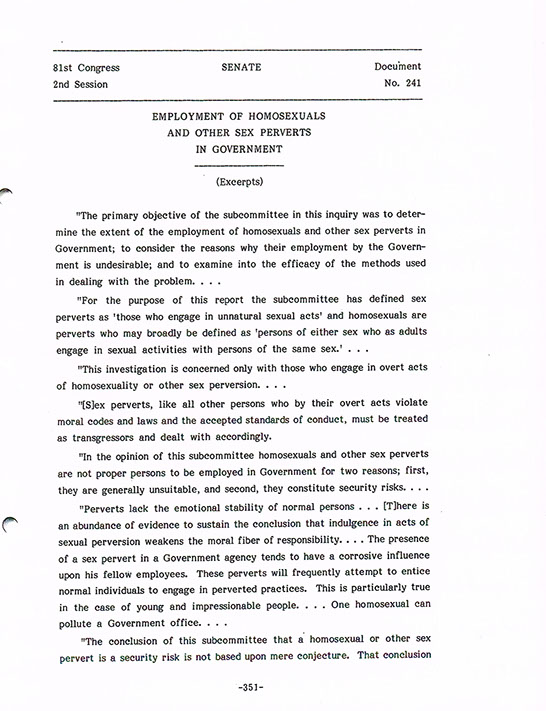
Front page of the Employment of Homosexuals and Other Sex Perverts in Government report. The full report may be found at: www.mwe.com/info/mattachineamicus/document14.pdf.
One of the most well-known and controversial figures in this story is J. Edgar Hoover, longtime director of the Federal Bureau of Investigation (FBI). Hoover ruled the FBI with an iron fist for nearly fifty years, and was a powerful force behind the creation of the national anti-gay police surveillance and censorship machine that originated in the 1940s and was developed in the 1950s.
Once Congress had established such powerful “evidence” against the homosexual population through its subcommittees and their reports, and with the press fanning the flames of public outrage, the FBI, under the direction of Hoover, led a massive national crackdown on homosexuals.
The Hoey committee's report had also included unexpected information that homosexuals did not necessarily conform to common stereotypes; they could be anyone, and they could even often blend in with the rest of the population. Before this it was commonly believed that gay men were all effeminate, and lesbians were all masculine, thus fairly easy to identify.
So, more drastic measures were called for, meaning intensive screening and surveillance of all citizens to root out homosexuals.
The FBI was tasked with supplying the Civil Service Commission with background information on employees and applicants, and took the initiative to establish contacts with police departments nationwide and to justify widespread surveillance.
The FBI arranged to obtain arrest records from vice squads on all those who were arrested on vice charges around the country, regardless of whether convictions had followed.
Further, regional FBI offices compiled data and lists of gay bars and other places frequented by gay people. Simply associating with homosexuals, or reports of an employee's having gay friends, became the only prerequisite for an investigation of anyone.
Additionally, the Immigration and Naturalization Service used the impetus to deport homosexual immigrants, with Republican backing.
In 1952, the Senate overruled President Truman’s veto on a bill, passing legislation that featured the first complete redrafting of the nation’s basic immigration and naturalization laws since 1798, to add sex perverts to the category of foreigners who cannot enter the country. The practice continued for years. For example, in 1955 it was reported by the United Press that “61 subversives were deported and 102 more had deportation proceedings started against them." "Subversive" was a term often employed in the era to avoid more salacious terminology like sex perverts, and words like homosexual; many considered the mere mention of these words distasteful.
The U.S. Post Office, which had a long history of censorship of mailable materials, was another important font of information and method of control for the federal government and the FBI in dealing with the homosexual problem.
Banned materials could be practically anything postal inspectors and government officials thought was inappropriate, and sometimes included the early homophile publication ONE magazine, a catalyst for the early gay community.
The Post Office became notorious in the gay community for censorship of the mails; enthusiastic postal inspectors harassed gay men and lesbians across the country with sweeping discretionary powers they used to decide what was obscene, and to intimidate their targets.
Postal inspectors snooped in their mail, tracking who received homosexual publications and joining pen pal clubs. When homosexuals were found, postal officials placed tracers on victims’ mail in order to locate other homosexuals.
Postal officials often went so far as to order the recipients of letters with what they considered suggestive content or offensive publications to report to their offices, and then would confront the person with the offending piece of mail and a pre-written document admitting he or she was indeed homosexual.
Postal officials confiscated the mail, and burned it or returned it to the sender, and generally promised that if these unfortunate individuals signed the forms, they would be left alone. Often, however, the officials would later notify the individual's family and employer, causing the loss of jobs and untold humiliation and personal anguish for many.
Ultimately, it was the postmaster general of Los Angeles’ repeated seizure, unfair censorship, and unjust banning of ONE Magazine that was the impetus for the Supreme Court case.
In a sanguine bit of humanity common in the beginning of all social equality movements, it was the cruelty and unreasonable hatred that was directed at gay men and lesbians that drove them to fight back, for many found themselves with nothing to lose.
It was the judgment made against gay men and lesbians en masse, as traitors, weaklings, and conspirators in this absurd and nonexistent plot to betray America to the communists that drove a small group of gay men and lesbians to found the first gay magazine in the country. They christened it ONE, The Homosexual Magazine, after a quotation by 19th-century British writer Thomas Carlyle that goes ”‘...a mystic bond of brotherhood makes all men one,’” which neatly reflects the narrative espoused by the founders, of organizing for social justice and equality for gay people.
The Hidden Enemy: Communists and Homosexuals
Americans were terrified of the communist’s mission: to weaken the nation through the insidious corruption of isolated and weak individuals by nefarious groups of communists and Nazis who could gain their power and information by manipulating and blackmailing morally debauched sexual perverts.
The majority of Americans knew little or nothing about homosexuals.
Most believed homosexuality was extremely rare, and associated it with mental illness, perversion, and criminal activity.
The idea that there were homosexuals everywhere had a profound impact on many Americans, who began viewing their friends, neighbors, and coworkers with suspicion of communist sympathies, homosexual activity – or both.
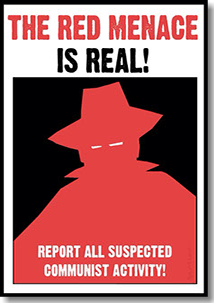
Complex fears of communists and child molesters were compounded simultaneously by a traditional American paranoia of sexuality, brought into the public consciousness in the late 1940s by the work of Alfred Kinsey, who revealed that between 4% and 10% of American men were homosexual.
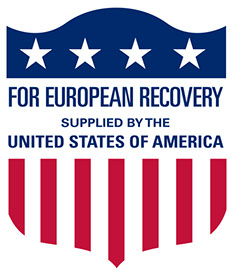
Icon of Harry Truman’s Marshall Plan. Photo courtesy of Google Images.
There were also several widely publicized cases of child molestation that happened at the time as well, which dramatically heightened fears of strangers and perverts.
In the minds of many Americans, the troubling milieu of child molesters, communists, and American security pointed easily and directly at one misunderstood and maligned group: sex perverts, or homosexuals, who were generally considered to be one and the same.
An unknown Republican from Wisconsin, Senator Joseph McCarthy, effectively exploited this maelstrom of fear of communists, Nazis, and Soviet spies, as well as anxiety about sexual perverts, child molesters, and homosexuality. The bombastic senator exploded onto the national political scene on February 9, 1950 in Wheeling, West Virginia when he accused the U.S. State Department of knowingly employing “205 card-carrying communists” during a speech to a Republican women’s group.
The resulting furor was further dramatized by the press, and quickly spread across the country.
The next day, under intense pressure to provide evidence and details to back up his accusations, of which there were few or none, McCarthy reduced their status to ‘bad risks,’ and the number to 57.
He followed his speech up with this telegram to the White House a few days later.
Soon the country was in an uproar, with letters and calls pouring in to senate offices and newspaper editors, demanding that something be done about the perceived threat of homosexuals to national security.
To the dismay of State Department officials, McCarthy had captivated the nation with his fiery and flamboyant rhetoric and the accusations soon became ingrained in the nation’s consciousness as fact and set in motion an unprecedented era of witch hunts against American citizens by their own government.
Today, McCarthyism is a term synonymous with corruption, gross manipulation, exaggeration, slander, and outrageous lies. However, at the time hundreds of sensational articles were printed in newspapers across the country, and the nation was outraged.
It was the ambiguous term ‘bad risk’ that ultimately allowed thousands of gay men and lesbians to be dragged into the maelstrom of panic and fear that swept the country over the rise of communism.
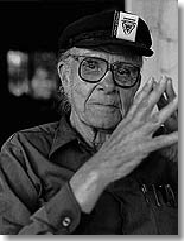
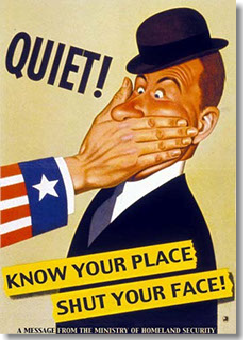
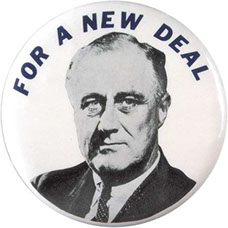
Campaign pin advertising F.D. Roosevelt’s New Deal. Photo courtesy of Google Images.
.
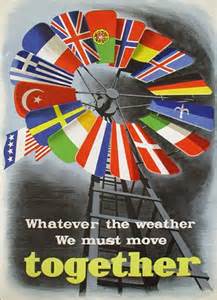
Poster advertising Truman’s Marshall Plan. Photo courtesy of Google Images.